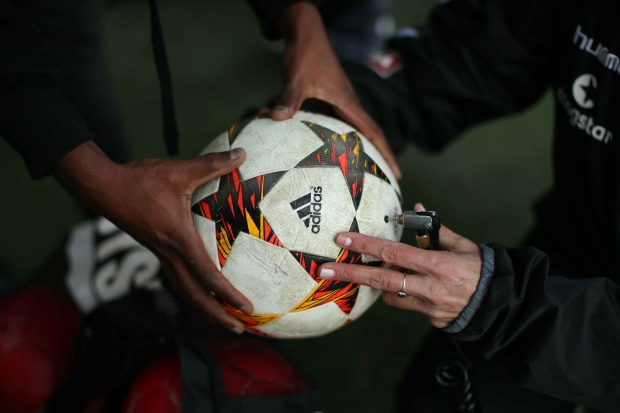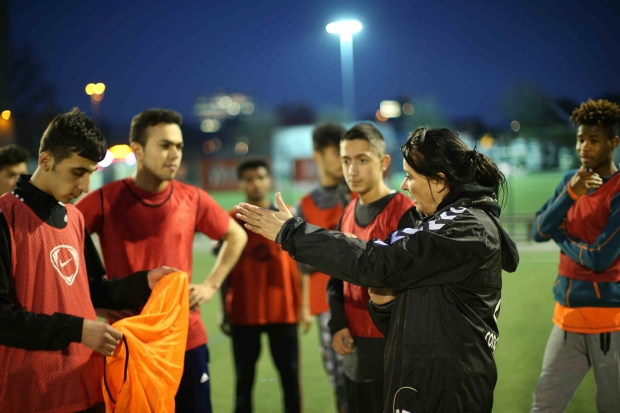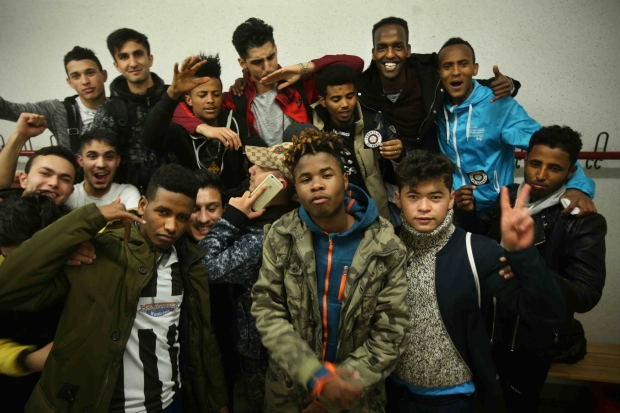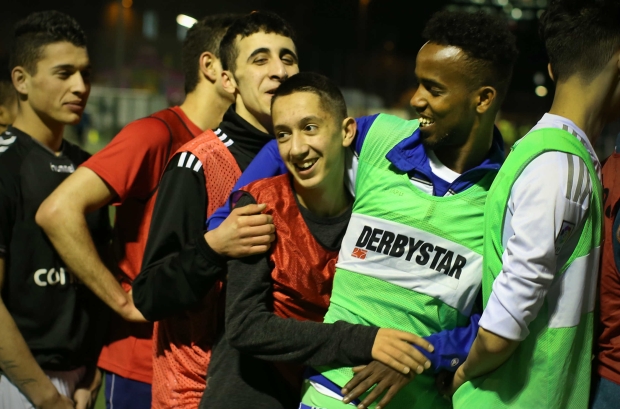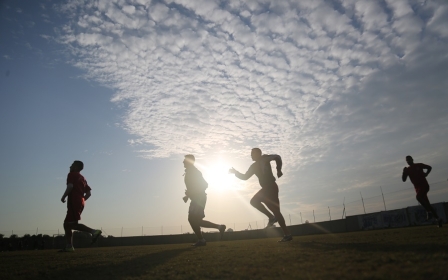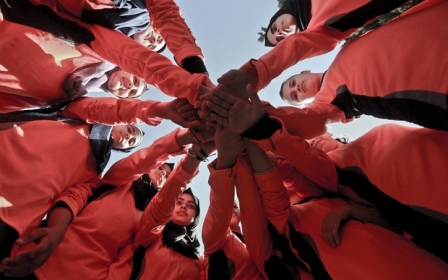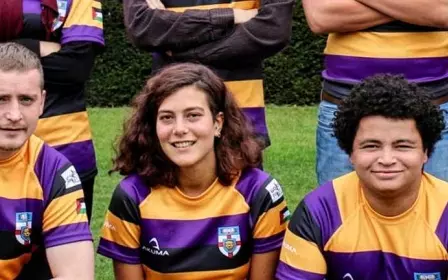FC Lampedusa: Germany's international refugee football team
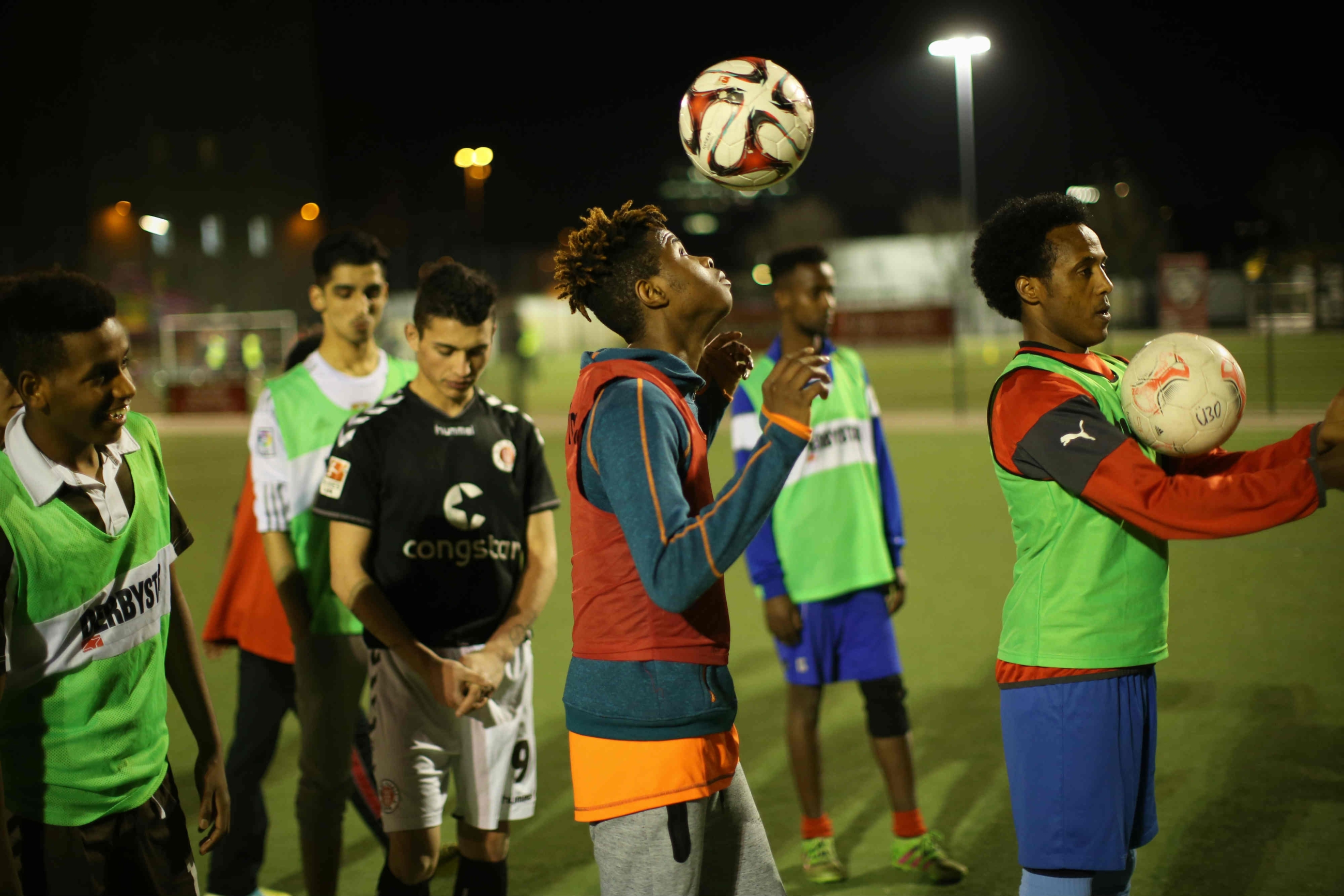
HAMBURG, Germany - The St Pauli quarter of Hamburg has a vibe all of its own. Situated on the river Elbe, it's famous for its beer halls, alternative atmosphere and football. But the port district has some new "players" in town, and they have come from very far away.
One is 22-year-old Tahir from Deir Ezzor in Syria.
As he moves across the playing field, he takes the ball with the grace of a swan before firing off a scorching right-footer, enabling the ball to bypass the goalie and go straight into the lower right corner of the opposing team's net.
Not able to hold back his satisfaction, an infectious grin breaks across Tahir's almost childlike face. His teammates waste no time in joining the celebration by swapping high-fives and words of praise.
Tahir is one of the nearly 40 members making up the FC Lampedusa St Pauli football club, but this is not just any team: the club's ever-changing roster is populated exclusively by refugees and migrants that come from all over the world.
The club was founded three years ago by local activists and retired football players and their continuous dedication to the project keeps the team going strong.
Over the past three years, almost 100 refugees and migrants have stepped up to don the team's colours, in a positive sign of solidarity amid the European refugee crisis.
Some continue to play, while others have been deported. Some have started entirely new lives elsewhere in Germany's prosperous north.
A love for football
"I can't tell you how I look forward to each practice session," Tahir says, while standing in front of the club's dressing room moments before practice.
Like many others in search of safety, the former student of petroleum engineering was forced to give up his studies and leave his hometown, currently controlled by the Islamic State group, and make the harrowing journey to Europe.
Many of his fellow players were also forced to choose between taking the so-called Balkan refugee route or Mediterranean route, journeys which sometimes took months, and were often marked by harsh weather conditions, cruel border agents, and, for many who never made it, death.
Having now been granted asylum and a work permit, Tahir can be considered one of the lucky ones. In their common struggle, the players always find something to talk about, but, despite the sorrows many have endured, football talk usually takes precedence, and Tahir loves every minute of it.
"The guys here, we have so much to talk about," he nods, while tying up his laces. "But most of all we love talking about football."
Though his family have not been able to join him, and currently reside in Turkey, his German host family him make him feel very welcome, he says. And come the autumn, Tahir plans to resume his education at a Hamburg university, in the hope that one day he will be able to help his family financially.
"My parents, my brother and two sisters are living in Turkey, and I want to start helping them as soon as possible. They wanted to stay there and they can’t join me, since I’m not a minor any more," he says.
Tahir is not a foreigner to football. Back home in Syria, he spent seven years playing for the local team. Here in Hamburg, his skills are quickly marking him out as a key player in this trans-border refugee club.
Long-term goal
FC Lampedusa's leader, Nico Appel, is one of five coaches in charge of the footballers and she is clear about what she wants to do for them.
"You know, there's help and then there's 'help'. We didn't want to be the sort of people who latch onto this whole refugee thing just to clear our consciences, and then walk away the minute it stops feeling fashionable. No way. We are not the helpers. Our aim was to set up something long term. Something community-based, something that can bring us all together for a constructive purpose," Appel says.
A graphic designer by trade, Appel is a long-time footballer, and still plays with an amateur women's club, though she has never played professionally. For the past 20 years, she has been tied to the iconic FC St Pauli squad, which boasts fan clubs all over the world.
The football club is also known for its proud anti-racist and anti-fascist stance, one that has often been lacking across Europe's great stadiums.
The activists' idea for the football club for refugees first came up four years ago when a 300-strong contingent of African refugees reached Hamburg from the Italian island of Lampedusa.
The local church took a number of them in, while city authorities said they did what they could. Yet many arrivals were soon at the mercy of the streets.
To help with the crisis, a few residents of the traditionally leftist St Pauli neighbourhood stepped in by offering food, shelter and protection. As they spent time together, refugees and activists took to playing a few matches and the refugee team was born.
'No race, no class, no gender'
This was still a time when both Germany and Europe saw the refugee question as something probably quite benign.
"All we wanted was to help these people escape the streets. A few of us activists huddled together and started organising picnics and German language classes, also a number of workshops," Appel says.
"We did what we could to keep these people safe. In many cases, their papers weren't exactly in order, and many were being threatened with deportation. So we decided to stand up for them, all in accordance with our slogan: no race, no class, no gender," she adds. "These were also the founding values of FC Lampedusa," she adds.
'Education and inclusion are always the key'
- Nico Appel, club coach
Coach Appel believes in dialogue and giving refugees all the time they need, and according to her, development and acceptance are key to this.
"You have to give traumatised people time and as much of your attention as you can. There is no other way: education and inclusion are always the key."
Germany has accepted over 900,000 refugees since 2015 and Angela Merkel has come under much criticism for a "loss of control" by people within her own party and leading opposition figures. Appel stresses that the need to continue working when the interest in refugees has lost its fervour is a must.
"I am not a teacher and I am not a social worker. But I really do want to make a difference. Over this last year, the mood in Germany had undergone a dramatic shift. Much of the initial enthusiasm is gone. It's much harder for refugees now. And this makes our job even more important."
'All of them have mothers, right?'
FC Lampedusa St Pauli is a club where anyone can play. As things stand, Appel refuses to place too high a premium on talent or skill.
For Appel, the only unwanted guests in this collective are insults and physical brutality. So far, two unmanageable players have been asked to leave the team because of an aggressive approach to the game. Yet Appel claims that players are very respectful of her position and being the only woman in a radically male environment does not get in the way of her coaching.
"Oh," she laughs, "That's not a problem. These guys have no objections to being trained by a woman. All of them have mothers, right? Their mothers were the ones who taught them how to survive. I can tell you these young men take me very seriously indeed. They are as respectful a bunch as you're likely to meet. All of them know very well why they're here. They are so touchingly grateful to us for sharing at least some of their burden," Appel says.
Appel is full of praise for St Pauli for loaning their training ground to the young migrant team. Not far from the club's new stadium she admits being an ardent supporter of the Argentinian national side and rooting for them even in the last World Cup final, even as they were being defeated by Appel's native Germany.
"Oh well," she shrugs and smiles, "I've always been attracted to flair and passion more than to any sort of a national component," she says.
Appel hopes to one day coach a team of women football players, but right now there are not enough women playing the game.
"Pass the ball, pass the ball, don't just dribble! Come on, Rooney, get that ball off you," one of the Somalian defenders yells out.
Under the floodlights on the artificial training turf, things were starting to heat up after 30 minutes of warming up. Then the team separated into two joyfully clashing squads.
Away fixture
Half the lads donned red shirts, and the other half decked themselves in green. The boys, whose age ranges between 15 and 24, grew ever more relaxed and playful. As their competitiveness got worked out of their system, Appel kept nodding from the sidelines.
This is also one of the main reasons FC Lampedusa does not take part in any of the official leagues. The lads only play an occasional tournament and a lot of friendly matches, both in Germany and abroad.
Most of them are still dazzled by their recent visit to Barcelona, which they were only able to pull off after a nightmarish struggle with bureaucrats and staff at one of the low-cost airlines at Hamburg airport who did not allow them to travel without passports; they had received special permission from the German state to travel.
'I never imagined I would ever again get to feel so safe and free as I do here in St Pauli'
- Mooto, Somalian player
Luckily, the almighty club from the Catalonian capital was happy to help out. Last November, the members of FC Lampedusa were greeted by the Barcelona mayor Ada Colau Ballano, who presented them with a special humanitarian award.
The sheer glee of that visit, however, was marred by one of the team members getting deported. A young player from Kosovo had an appointment with the foreigners’ registration office in Hamburg on the morning of the team's departure to Barcelona. He had been asked to leave Germany within one week and was sent to a closed camp near the airport. The players were devastated.
'Safe and free'
At the club's premises, we met Mooto, an 18-year-old Somalian. The FC Lampedusa forward had arrived in Germany a little more than two years ago, after months of a perilous journey.
Starting out at his village near Mogadishu, he first crossed Ethiopia and Sudan. Then he spent a few months in Libya, waiting for his boat to Europe. After the dangerous sailing – last year, more than 5,000 refugees and migrants perished during the crossing – he and his 200 fellow travellers alighted in Sicily. After a month in the Italian refugee camps, where conditions were much better than in Libya, Mooto regained some strength, then he pressed on to Germany.
"It was hard," he says, recalling the experience, "but it was worth it. I never imagined I would ever again get to feel so safe and free as I do here in St Pauli. Oh, and I never imagined I would be able to play football with my friends!"
Mooto lives in a government-run integration house for refugees, alongside many of his team-mates. Back home in Somalia he played football every day, no matter how violent the long civil war had become.
FC Lampedusa's practices are scheduled for every Thursday night. During the week, most of the members play with other local clubs in Hamburg and in the area. As this session was drawing to a close, it felt just like a training session of any slightly above-par amateur squad, just without nearly as many fouls, shouts and cursing: there was no rough physical contact to speak of.
On the training field, one could detect very little strict hierarchy and even fewer set roles. Also wonderfully lacking were any of those authoritarian coaching interventions so plentiful almost everywhere else.
Universal language
"You know, all that aggression and machismo – that's the reason I never cared to play football with men," Appel says, while gently steering the session to a close. "Male football is much too competitive. Football itself is a magnificent game, offering almost boundless therapeutic and training potential."
Appel is also quick to say that in Germany, women have only been allowed to play football since 1974. She made no secret of the fact she was on a mission, a humanist emancipatory quest.
As a born footballer she knows the sacred game to be one of the few universal languages available: a language that can be mastered to undreamt of heights or just barely stuttered – but a language understood by all.
New MEE newsletter: Jerusalem Dispatch
Sign up to get the latest insights and analysis on Israel-Palestine, alongside Turkey Unpacked and other MEE newsletters
Middle East Eye delivers independent and unrivalled coverage and analysis of the Middle East, North Africa and beyond. To learn more about republishing this content and the associated fees, please fill out this form. More about MEE can be found here.


